新概念2 Lesson 53 Hot Snake教学课件(共70张PPT)
文档属性
| 名称 | 新概念2 Lesson 53 Hot Snake教学课件(共70张PPT) | 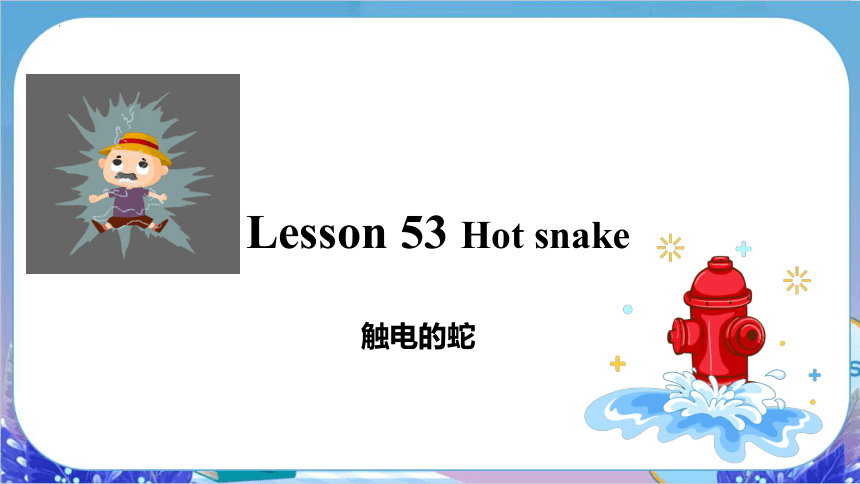 | |
| 格式 | pptx | ||
| 文件大小 | 3.3MB | ||
| 资源类型 | 教案 | ||
| 版本资源 | 新概念英语 | ||
| 科目 | 英语 | ||
| 更新时间 | 2024-03-25 11:28:53 | ||
图片预览

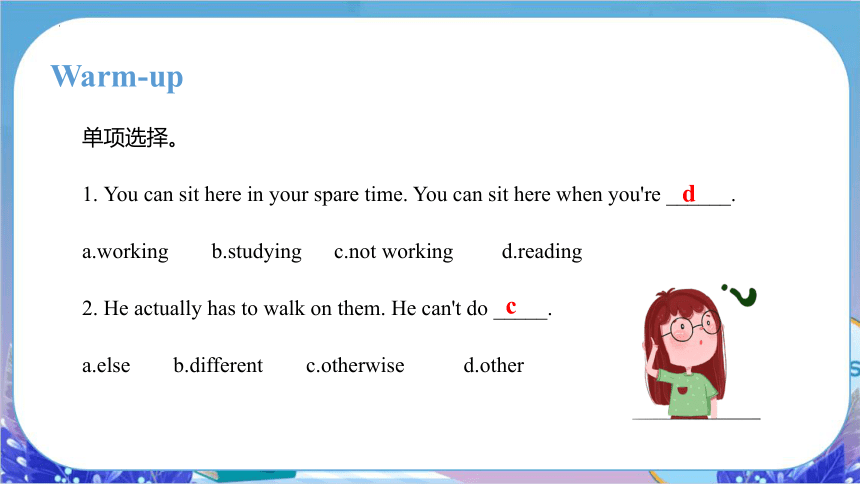
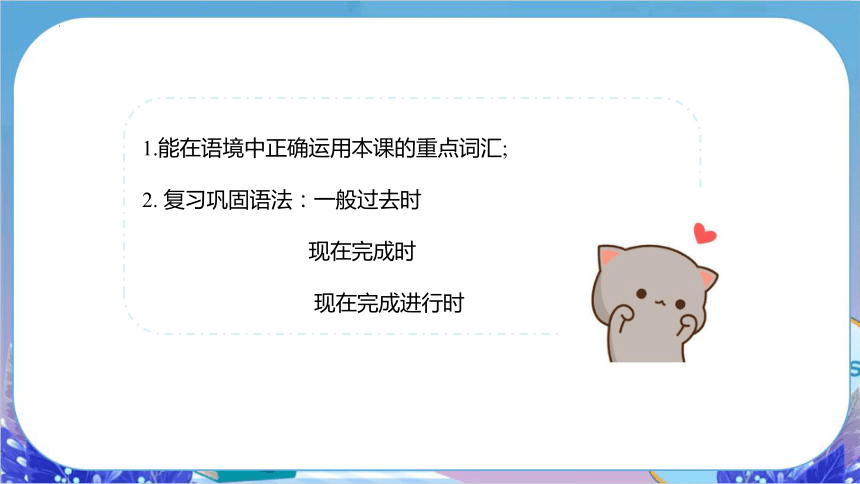
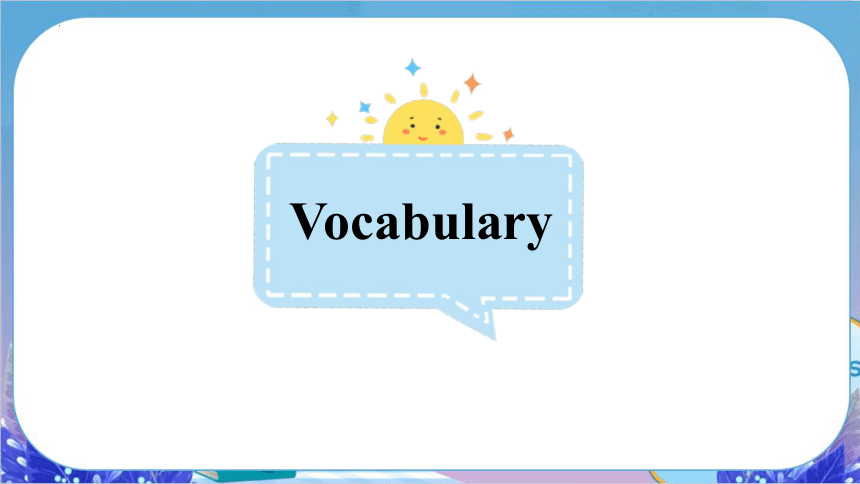
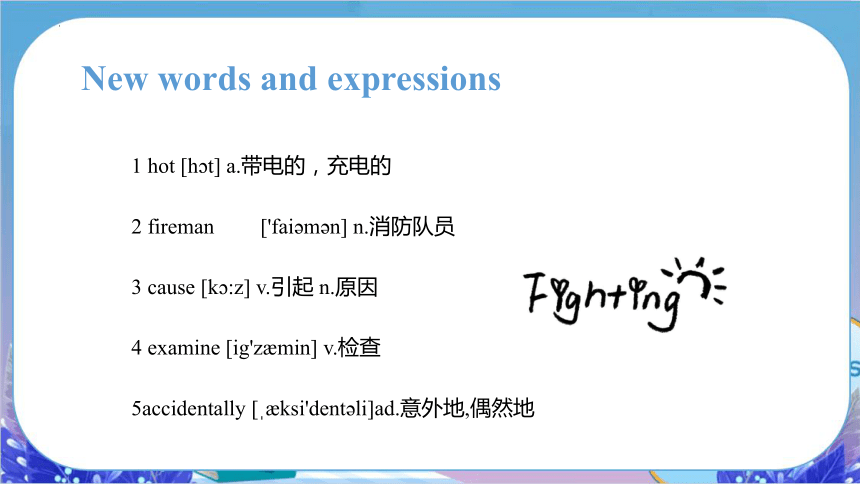
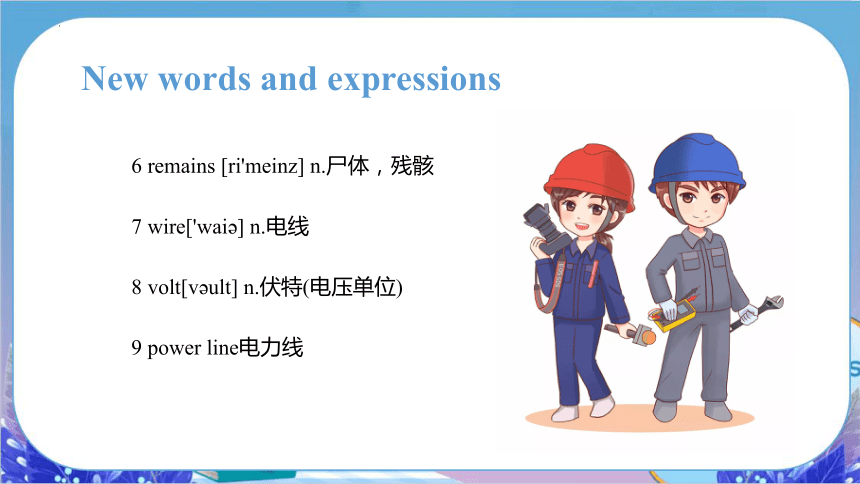
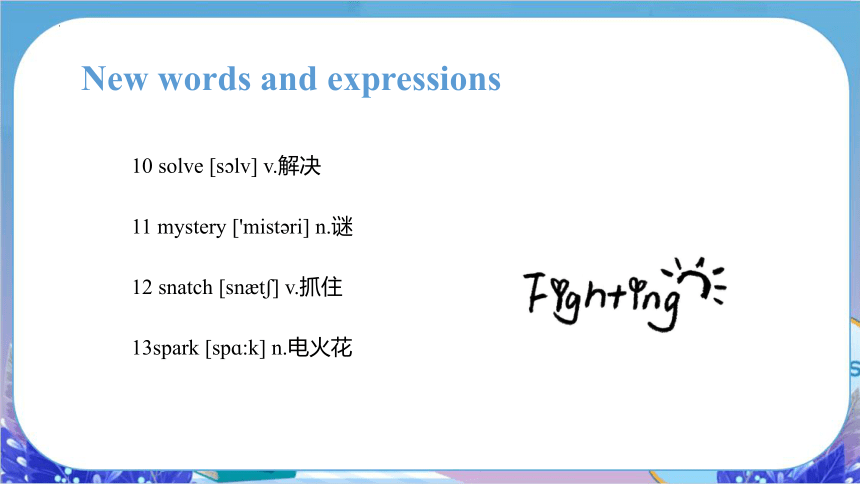
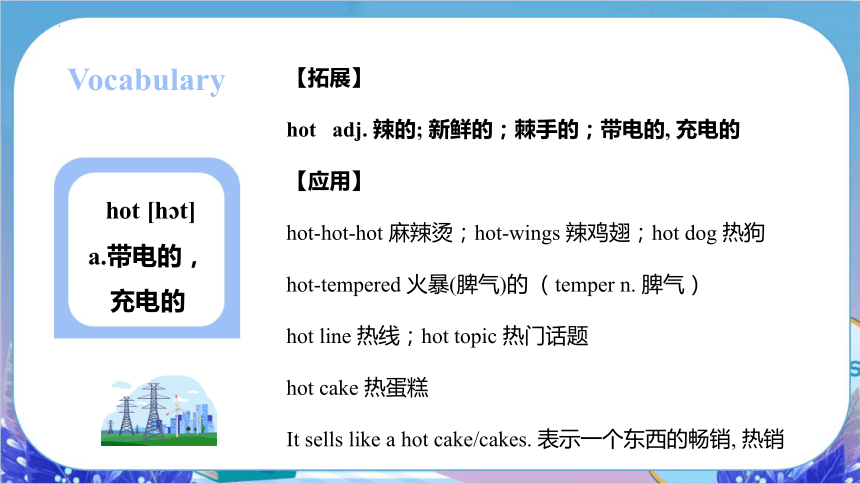
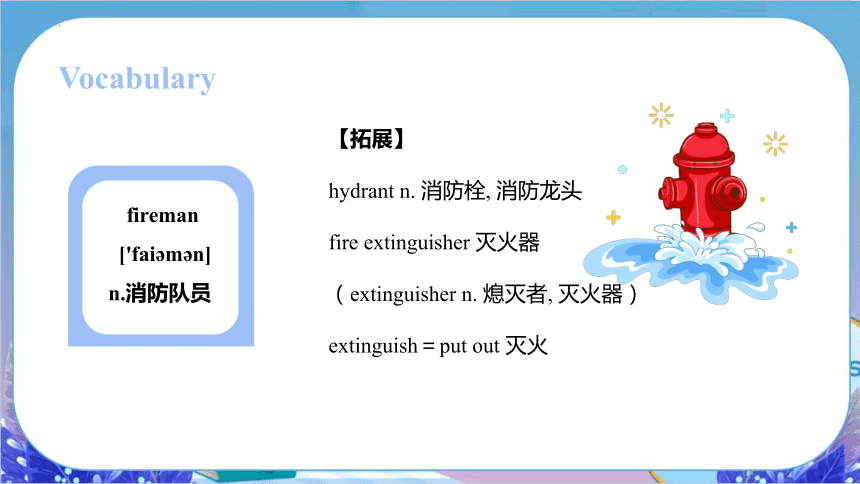
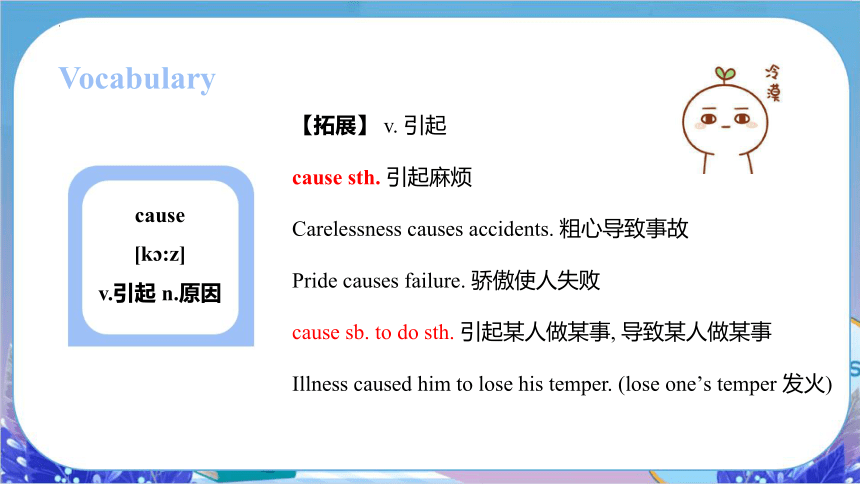
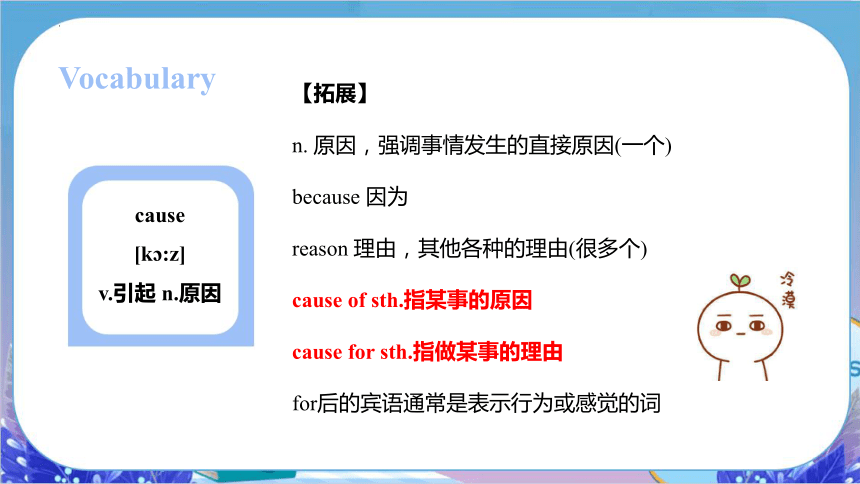
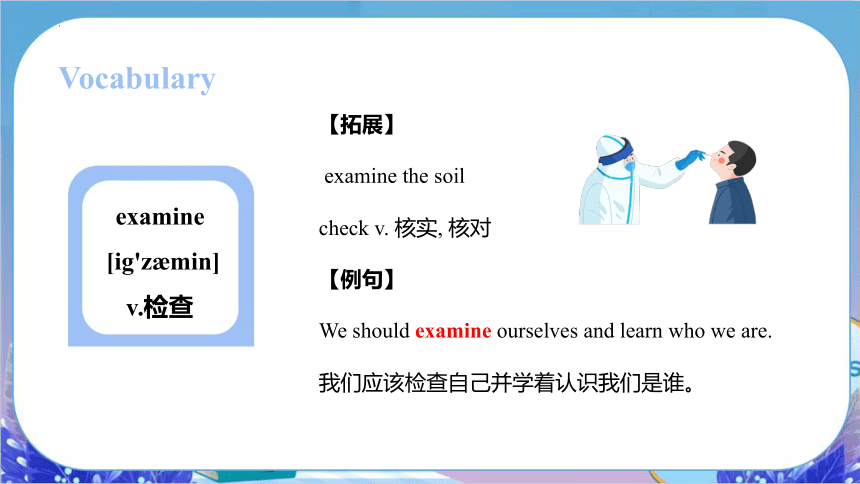
文档简介
(共70张PPT)
Lesson 53 Hot snake
触电的蛇
单项选择。
1. You can sit here in your spare time. You can sit here when you're ______.
a.working b.studying c.not working d.reading
2. He actually has to walk on them. He can't do _____.
a.else b.different c.otherwise d.other
Warm-up
d
c
1.能在语境中正确运用本课的重点词汇;
2. 复习巩固语法:一般过去时
现在完成时
现在完成进行时
Vocabulary
New words and expressions
1 hot [h t] a.带电的,充电的
2 fireman ['fai m n] n.消防队员
3 cause [k :z] v.引起 n.原因
4 examine [ig'z min] v.检查
5accidentally [ ksi'dent li]ad.意外地,偶然地
New words and expressions
6 remains [ri'meinz] n.尸体,残骸
7 wire['wai ] n.电线
8 volt[v ult] n.伏特(电压单位)
9 power line电力线
New words and expressions
10 solve [s lv] v.解决
11 mystery ['mist ri] n.谜
12 snatch [sn t ] v.抓住
13spark [spɑ:k] n.电火花
Vocabulary
hot [h t]
a.带电的,充电的
【拓展】
hot adj. 辣的; 新鲜的;棘手的;带电的, 充电的
【应用】
hot-hot-hot 麻辣烫;hot-wings 辣鸡翅;hot dog 热狗
hot-tempered 火暴(脾气)的 (temper n. 脾气)
hot line 热线;hot topic 热门话题
hot cake 热蛋糕
It sells like a hot cake/cakes. 表示一个东西的畅销, 热销
【拓展】
hydrant n. 消防栓, 消防龙头
fire extinguisher 灭火器
(extinguisher n. 熄灭者, 灭火器)
extinguish=put out 灭火
Vocabulary
fireman
['fai m n]
n.消防队员
【拓展】 v. 引起
cause sth. 引起麻烦
Carelessness causes accidents. 粗心导致事故
Pride causes failure. 骄傲使人失败
cause sb. to do sth. 引起某人做某事, 导致某人做某事
Illness caused him to lose his temper. (lose one’s temper 发火)
Vocabulary
cause
[k :z]
v.引起 n.原因
【拓展】
n. 原因,强调事情发生的直接原因(一个)
because 因为
reason 理由,其他各种的理由(很多个)
cause of sth.指某事的原因
cause for sth.指做某事的理由
for后的宾语通常是表示行为或感觉的词
Vocabulary
cause
[k :z]
v.引起 n.原因
【拓展】
examine the soil
check v. 核实, 核对
【例句】
We should examine ourselves and learn who we are.
我们应该检查自己并学着认识我们是谁。
Vocabulary
examine
[ig'z min]
v.检查
Vocabulary
accidentally
[ ksi'dent li]
ad.意外地,偶然地
【拓展】
accident->accidental->accidentally
accident n. 事故
unexpectedly adv. 出乎意料地(更趋向于 “意外” 的意思)
【例句】
I accidentally broke a glass.
我不小心把玻璃杯摔了。
【拓展】
remains 指 dead body
【例句】
More human remains have been unearthed in the north.
更多人类遗骸在北方挖掘出土。
Vocabulary
remains
[ri'meinz]
n.尸体,残骸
Vocabulary
wire
['wai ]
n.电线
volt
[v ult]
n.伏特(电压单位)
spark
[spɑ:k]
n.电火花
【拓展】
n.1. 能力,精力 2. 功率,动力,电力
3,幂,乘方4,权力,势力,政权
【词组】 come into power (开始)执政,当权;
have sb. in one's power控制住某人;
power station发电站;
power politics强权政治;
power structure权力结构
Vocabulary
power line
电力线
【拓展】
solve the mystery
solve the problem
【例句】
She tried her best to solve the problem.
她尽了最大的努力解决这个问题。
Vocabulary
solve
[s lv]
v.解决
【拓展】
n.1.神秘,秘密 2.神秘的事物,不可思议的事物
【词组】 an air of mystery神秘的气氛;
make a mystery of把……搞得神秘;
It's a mystery to me.这对我来说是个秘密。
【用法】 mystery novel/story/tale神秘小说,包括怪诞、侦探、推理小说等。这时不能用 mysterious 来修饰。
Vocabulary
mystery
['mist ri]
n.谜
【拓展】
catch v. 抓,如抓鱼
hold v. 握着
snatch v. (突然抓起来)强调动作的突然性
snatch up 一把抓住
seize v. 抓住(用力)
seize my arm
Vocabulary
snatch
[sn t ]
v.抓住
Text
What caused the fire?
At last firemen have put out a big forest fire in California. Since then, they have been trying to find out how the fire began. Forest fire are often caused by broken glass or by cigarette ends which people car elessly throw away. Yesterday the firemen examined the ground carefully, but were not able to find any broken glass. They were also quite sure that a cigarette end did not start the fire. This morning, however, a fireman accidentally discovered the cause. He noticed the remains of a snake which was wound round the electric wires of a 16,000-volt power line. In this way, he was able to solve the mystery. The explanation was simple but very unusual. A bird had snatched up the snake from the ground and then dropped it on to the wires. The snake then wound itself round the wires. When it did so, it sent sparks down to the ground and these immediately started a fire.
At last firemen have put out a big forest fire in California. Since then, they have been trying to find out how the fire began. Forest fire are often caused by broken glass or by cigarette ends which people car elessly throw away. Yesterday the firemen examined the ground carefully, but were not able to find any broken glass. They were also quite sure that a cigarette end did not start the fire. This morning, however, a fireman accidentally discovered the cause. He noticed the remains of a snake which was wound round the electric wires of a 16,000-volt power line. In this way, he was able to solve the mystery. The explanation was simple but very unusual. A bird had snatched up the snake from the ground and then dropped it on to the wires. The snake then wound itself round the wires. When it did so, it sent sparks down to the ground and these immediately started a fire.
At last firemen have put out a big forest fire in California.
消防队员们终于扑灭了加利福尼亚的一场森林大火。
put out 既可表示“扑灭,熄灭”,也有“关掉”的含义,可以和 turn/switch off 替换。Please put the light out.
fire 指“火焰”时不可数,但指“一堆火”或“一场火”是可数
I am afraid of fire.Sit around a fire.
最后
扑灭
Since then, they have been trying to find out how the fire began.
从那时起,他们试图找出起火的原因。
find out 表示“查明,查出”,通常意味着经过一番努力<如经过询问、研究、搜寻、调查)后才能发现。
e. g. They are trying to find out who committed the murder.
现在完成进行时
从那时起,到现在为止
Forest fires are often caused by broken glass or by cigarette ends which people carelessly throw away.
森林火灾时常由破碎的玻璃或人们随手扔掉的香烟头引起。
broken glass 被打碎的玻璃片
cigarette ends 烟头
由......引起的
香烟头
扔掉
They were also quite sure that a cigarette end did not start the fire.
他们还十分肯定火灾也不是由烟头引起的。
be sure that 对……很有把握;quite sure 相当的把握性
引起
start在本文中是引发的意思。
1)使……e, g. The smoke started him coughing.
2)创办:e. g. He is thinking of starting a newspaper.
3) 启动:e. g. Do you know how to start the motor
4) 雇用:e. g. The bank started her as a teller.
This morning, however, a firemen accidentally discovered the cause.
然而,今天早上,一名消防员意外发现了起火原因。
accidentally =by chance 偶然地
discover 本身含有偶然发现(某个已经存在的东西)的含义
I don’t know who discovered America.
He noticed the remains of a snake which was wound round the electric wires of a 16,000-volt power line.他发现了缠绕在16,000伏高压线上的一条死蛇。
本句的主句是He noticed the remains of a snake,which 引导的定语从句修饰先行词snake, 而 of引导介词短语修饰 wires.
the remains表示“尸体”、“残骸”,必须用复数形式。
wound 为 wind 的过去分词。
wind“卷在……上”、“缠绕”。
e. g. She wound her injured legs with a bandage.
注意
上楼
尸体
In this way, he was able to solve the mystery.
就这样,他解开了这个谜团。
be able to 能够 ;be not able to 没有能够
就这样
A bird had snatched up the snake from the ground and then dropped it on to the wires.
一把抓住
来自......
1)hold 握住e. g. He held a knife in his hand.
2) snatch 粗鲁快速地抓住e. g. He snatched the ball out of my hand.
3) grab快速地抓住e. g. Dad grabbed some breakfast and went off to work.
4) seize 强调抓住,抓到的结果
e. g. He seized her hand and shook it heartily.
A bird had snatched up the snake from the ground and then dropped it on to the wires.
一把抓住
来自......
1)drop表示“使落下,使掉落”,是及物动词,带宾语。
e. g. The one with the money got such a fright that he dropped the bag.
2)fall表示“掉下、跌倒”,是不及物动词,不能带宾语。
e. g. He fell down the stairs and broke his leg.
1 Firemen examined the ground carefully because they________
(a) were looking for cigarette ends
(b) were looking for broken glass
(c) wanted to find out what had caused the fire
(d) were looking for a snake
2 The fire had been caused by_________
(a) a bird which flew on to the wires
(b) a snake which climbed on to the wires
(c) a bird which was eating a snake
(d) a snake which had been dropped on to the wires by a bird
Questions:
Grammar
现在完成进行时
Grammar
现在完成进行时态所描述的是从过去某一时刻开始的动作,一直持续到现在,也许还将持续下去,也许马上就要结束。既有“完成”的概念,又有“进行”的概念,通常与表示一段时间的状语连用,如:for hours,since 1990等。是一复合时态,属于现在时态范畴。
Grammar
现在完成进行时
1. 构成:have/has been+现在分词
单数 复数
I have You have been working He(She / It) We
You have been working
They
Grammar
现在完成进行时用法
①过去的动作对现在的延续。表示从过去某个时间开始一直延续到现在的动作,这个动作可能仍在进行中,并继续下去,也可能刚刚停止。
时间状语: all the time, all the morning, for two hours, all night, these few days, this week等表示一段时间的状语连用。如果表示某一动作的起点, 可用since引导的短语或从句; 如果表示某一动作的全部时间,可用for引导的短语。
例如:What have you been doing these days 这些天你在干什么
Grammar
②重复的动作表示感彩。有时候,现在完成进行时不是指某动作一直在不停地进行,而是表示一直到说话时为止的一段时间内一再重复的动作,常带有感彩。
例如:He's been watching television the whole day.他看了一天电视了。
现在完成进行时用法
Grammar
现在完成进行时用法
③已结束的动作所产生的影响。有时候,现在完成进行时表示“刚才”或“近来”发生的动作,表示直到说话时为止的一段时间内发生的动作。这一动作到说话时已经结束,而且一般不再继续下去;这种用法主要表示某一动作所产生的结果或对现在的影响。
例如:He's been studying too hard.他工作太辛苦了。(言外之意:He looks too tired.)
Grammar
①这两个时态总的说来是不同的。
现在完成时常常表示动作已经完成,而现在完成进行时却并不如此。
例如:I have read the novel.我已经读过这本小说了。(其含义是:我现在了解小说的内容。)
I am reading the novel now.我在读这本小说。
(其含义是:我现在在干什么,不涉及什么时候开始,什么时候结束。)
I have been reading the novel.我一直在读这本小说。
(其含义是:从过去某一时间开始,我在读这本小说,也许还要读下去,也许马上结束。)
现在完成时和现在完成进行时的比较
Grammar
②另外,有些静态动词只能用于现在完成时,一般不能用于完成进行时,例如下面的句子就不宜改用进行时:
I've known him for several years.我认识他有几年了。
The war has lasted for a long time.这场战争持续了很长时间.
现在完成时和现在完成进行时的比较
Grammar
过去完成进行时
1. 构成:had been+现在分词
Grammar
过去完成进行时用法
表示动作从过去某一时间之前开始,到过去某一时间仍在进行或刚刚结束;同过去完成时一样,过去完成进行时必须以某一特定过去时间为前提。
例如:He had been working here before he went to Shanghai.
他去上海之前,一直在这里工作。
I had been waiting outside for half an hour before she called me in.
在她喊我进去之前,我已经在外面等了半个小时。
Grammar
过去完成进行时与现在完成进行时的比较。
①这个时态和现在完成进行时是很相似的,只不过是把着眼点移到过去罢了。
现在完成进行时(现时观点) (至现时还在进行) 过去完成进行时(过去观点)
(至过去某个时刻还在进行)
He has been working for twenty years. 他至今已工作20 年了.(现在他仍在工作) How long have you been playing football 至今你踢球有多长时间? He had been working for twenty years when heretired.
当他退休时他工作了20年.
I asked them how long they had been playing football.
我问他们踢球多长时间了
Grammar
过去完成进行时与现在完成进行时的比较。
②过去完成时和现在完成时一样,表示动作已经完成;过去完成进行时表示一个一直持续的动作,而这动作未必已经完成:
过去完成时 过去完成进行时
She told me she had written a TV play. 她告诉我她写了一个电视剧。(已完成) He had painted the picture blue. 他把画涂成了蓝色.(已涂好) She said she had been writing a TV play.
她说她一直在写一个电视剧.(可能尚未完成)
He had been painting the picture all afternoon.
整个下午他都在给画上色。(可能还在涂)
Grammar
1、You should go to bed. You _____ (watch) TV for 5 hours.
2、I _____ (write) letters since breakfast.
3、I _____ (write) 3 letters since breakfast.
4、Sorry, but Mr.Smith _____ (leave) for Beijing.
5、I _____ (look) for him everywhere, where can he be
Grammar
答案:
1、have been watching/have watched
2、having been writing
3、have written
4、has left
5、have been looking
Grammar
引导原因状语从句的词或词组有:because(因为),since(既然),as(由于),now that(既然)等。
例如:As water'vapour is extremely light,it often rises high in the sky.
由于水蒸气极轻,故常常升入高空。
But since the teacher said so it must be true.
既然老师那样说了,那么它肯定是真的。
原因状语从句
Grammar
(一)原因状语从句主要由because, as, since引导
例句:He was angry because we were late.他很生气因为我们迟到了。
Since you are going,I will go.既然你去,我也去。
in case,just in case也可引起原因状语从句:
He took a spoonful and tasted it in case it was hot.他盛了一勺,尝尝看烫不烫。
Grammar
还有一些原因状语从句不带连词(下面 seeing 和 considering 却起连词作用)
例句:Seeing that it is ten o'clock,we shall not wait for her any longer.
由于现在已经十点钟,我们就不再等她了。
Considering he's only been learning English a year,he speaks it very well.
考虑他学英语才一年,他讲得算是很好了。
Grammar
另外,某些“be+形容词”结构后的从句也说明原因
例如:I'm glad (that) you've been assigned a new job.我很高兴你分配了新工作.
She was annoyed that he had broken her vase.
她生气了,因为他把她的花瓶打破了。
She was hurt that I had not gone to her party.
我没去参加她的晚会令她感到不快。
Grammar
1. because表示原因的口气最重,直接表示因果关系,回答why的问题,强调别人未知的事实,而 since, as 引导的原因状语从句一般表示已知的事实,强调引起的后果。
He didn't go to school today because he was ill.
他今天没有去上学是因为生病了。
Since you know you are wrong,you had better admit it.
既然你知道你错了,最好赶快承认。
Grammar
2.强调原因状语从句只能用because从句。
如 It was because he was ill that he didn't go to school.正因为他病了,他才没有去上学。
3.for引出的并列句表示原因,常是逻辑推理的原因。
如:The day must have broken, for birds are singing loudly.
天一定亮了,因为鸟儿在大声叫着。
Grammar
throw to,throw at and throw away
throw 作及物动词主要含义为“投,掷,抛,扔”。
throw to (sb.) 扔给(某人)【例】He threw the ball to me and I caught it.
throw at 对准某一目标扔
【例】The boy threw a stone at the window and broke it.
throw away 扔掉,丢弃
【例】Many people throw away cigarette ends carelessly.
Grammar
1. He was able to solve the mystery. He ______.
a.could if he wanted to b.could but he didn't want to
c.succeeded in solving it d. didn't succeed in solving it
2 In this way he was able to solve the mystery. ______he did it.
a.That's so b.Like this c.That's how d. So
c
c
Practice
翻译本课所学的词组。1.最后,终于____________________ 2 .弄清,查明____________________
3.碎玻璃 ____________________ 4. 烟头 ____________________
5.就这样 ____________________ 6. 扔掉,丢弃____________________7.抓起来 ____________________ 8. 缠绕 ____________________9. 从那时起____________________ 9. 扑灭 ____________________
用所给单词或短语的正确形式填空
be sure cause put out
snatch throw (…) away wind (…) round
1.It’s wasteful to ________________ paper and metal.
2.It was very difficult to ________________ the big fire on the gas station.
3.He ________________ that he will succeed one day because he is really confident of himself.
用所给单词或短语的正确形式填空
be sure cause put out
snatch throw (…) away wind (…) round
4.In the experiment, a hair _______________ a thin piece of wood.
5.The thief ________________ her handbag and ran.
6.Heavy traffic _______________ delays on the freeway.
根据汉语提示完成下列句子。
1.Joyce八岁的时候注意到家乡的海滩上到处都是烟头。
Joyce was 8 years old when she noticed that ______ were littering her hometown beach.
2.如果你不会生火,就只能坐在食物旁边挨饿了。
If you don’t know _____________, you will have to sit by the food, starving.
从[A]、[B]、[C]、[D]四个选项中,选出可以填入空白处的最佳选项。
1. —How is the weather in your country this summer
—It ________ as much as it does now for a long time.
[A]hasn’t rained [B]doesn’t rain
[C]wasn’t raining [D]didn’t rain
2.I feel sure I _________ her before somewhere.
[A]was to meet [B]have met
[C]had met [D]would meet
3.I had hoped to see her off at the station, but I ________ too busy.
[A]was [B]had been
[C]would be [D]would have been
4 She ought to stop working; she has a headache because she ________ too long.
[A]has been reading [B]had read
[C]is reading [D]read
5. The Oscar is one of the film prizes ________ offered to any Chinese actor or actress so far.
[A]which are not [B]that have not been
[C]that has not [D]that has not been
用括号内所给单词的适当形式完成句子。
1.You ________ (miss) your turn so you’ll have to wait.
2.—Don’t put the waste on the ground.
—Oh, I’m sorry. I ________ (see) the dustbin there.
3.—Why do you look so worried
—Fred left the company half an hour ago. His work ________ (leave) unfinished since.
用括号内所给单词的适当形式完成句子。
4.I wonder why Jenny _____ (not write) us recently. We should have heard from her now.
5.—Have you ever worked with a tape recorder
—I ________ (use) it a lot when I was studying French in school.
6.I would have come sooner but I _________ (not know) that they were waiting.
用本课所学的单词的适当形式填空。
1. A bowl of h_____________ chicken soup is good for you.
2. The well-trained f_____________ can get over this tall wall easily.
3. A cigarette s_____________ started the fire.
4. He s_____________ up his gun and fired.
5. She asked me to w_____________ the wool for her.
用本课所学的单词的适当形式填空。
6. This problem is too difficult for me to s_____________.
7. She is always c_____________trouble for people.
8. The teacher will e_____________ the students in English.
9. They have found prehistoric r__________.
10. Why he went there is a m________ to me.
根据句意选用适当词组填空 。
complain about care for consist of check in communicate with
catch a cold come on compete with come true come to an end
6. ___________, boys and girls, the bus is coming!
7. After 4 years’ hard work, Mary’s dream ___________ at last.
8. A week ____________ seven days.
9. The term will ____________ in June.
10. In the football game we ____________ each other heatedly and friendly.
根据句意选用适当词组填空 。complain about care for consist of check in communicate with
catch a cold come on compete with come true come to an end
1. I want to ___________ these rotten apples I bought yesterday.
2. Mary is studying in France; she _________ us by e-mail.
3. The boy had no friends to _________ him.
4. It’s very easy for the old to ___________.
5. Passengers should ___________ for flight BA 125 to London.
Lesson 53
hot fireman cause examine accidentally remains wire volt power line solve mystery snatch spark
一般过去时
现在完成时
现在完成进行时
Lesson 53 Hot snake
触电的蛇
单项选择。
1. You can sit here in your spare time. You can sit here when you're ______.
a.working b.studying c.not working d.reading
2. He actually has to walk on them. He can't do _____.
a.else b.different c.otherwise d.other
Warm-up
d
c
1.能在语境中正确运用本课的重点词汇;
2. 复习巩固语法:一般过去时
现在完成时
现在完成进行时
Vocabulary
New words and expressions
1 hot [h t] a.带电的,充电的
2 fireman ['fai m n] n.消防队员
3 cause [k :z] v.引起 n.原因
4 examine [ig'z min] v.检查
5accidentally [ ksi'dent li]ad.意外地,偶然地
New words and expressions
6 remains [ri'meinz] n.尸体,残骸
7 wire['wai ] n.电线
8 volt[v ult] n.伏特(电压单位)
9 power line电力线
New words and expressions
10 solve [s lv] v.解决
11 mystery ['mist ri] n.谜
12 snatch [sn t ] v.抓住
13spark [spɑ:k] n.电火花
Vocabulary
hot [h t]
a.带电的,充电的
【拓展】
hot adj. 辣的; 新鲜的;棘手的;带电的, 充电的
【应用】
hot-hot-hot 麻辣烫;hot-wings 辣鸡翅;hot dog 热狗
hot-tempered 火暴(脾气)的 (temper n. 脾气)
hot line 热线;hot topic 热门话题
hot cake 热蛋糕
It sells like a hot cake/cakes. 表示一个东西的畅销, 热销
【拓展】
hydrant n. 消防栓, 消防龙头
fire extinguisher 灭火器
(extinguisher n. 熄灭者, 灭火器)
extinguish=put out 灭火
Vocabulary
fireman
['fai m n]
n.消防队员
【拓展】 v. 引起
cause sth. 引起麻烦
Carelessness causes accidents. 粗心导致事故
Pride causes failure. 骄傲使人失败
cause sb. to do sth. 引起某人做某事, 导致某人做某事
Illness caused him to lose his temper. (lose one’s temper 发火)
Vocabulary
cause
[k :z]
v.引起 n.原因
【拓展】
n. 原因,强调事情发生的直接原因(一个)
because 因为
reason 理由,其他各种的理由(很多个)
cause of sth.指某事的原因
cause for sth.指做某事的理由
for后的宾语通常是表示行为或感觉的词
Vocabulary
cause
[k :z]
v.引起 n.原因
【拓展】
examine the soil
check v. 核实, 核对
【例句】
We should examine ourselves and learn who we are.
我们应该检查自己并学着认识我们是谁。
Vocabulary
examine
[ig'z min]
v.检查
Vocabulary
accidentally
[ ksi'dent li]
ad.意外地,偶然地
【拓展】
accident->accidental->accidentally
accident n. 事故
unexpectedly adv. 出乎意料地(更趋向于 “意外” 的意思)
【例句】
I accidentally broke a glass.
我不小心把玻璃杯摔了。
【拓展】
remains 指 dead body
【例句】
More human remains have been unearthed in the north.
更多人类遗骸在北方挖掘出土。
Vocabulary
remains
[ri'meinz]
n.尸体,残骸
Vocabulary
wire
['wai ]
n.电线
volt
[v ult]
n.伏特(电压单位)
spark
[spɑ:k]
n.电火花
【拓展】
n.1. 能力,精力 2. 功率,动力,电力
3,幂,乘方4,权力,势力,政权
【词组】 come into power (开始)执政,当权;
have sb. in one's power控制住某人;
power station发电站;
power politics强权政治;
power structure权力结构
Vocabulary
power line
电力线
【拓展】
solve the mystery
solve the problem
【例句】
She tried her best to solve the problem.
她尽了最大的努力解决这个问题。
Vocabulary
solve
[s lv]
v.解决
【拓展】
n.1.神秘,秘密 2.神秘的事物,不可思议的事物
【词组】 an air of mystery神秘的气氛;
make a mystery of把……搞得神秘;
It's a mystery to me.这对我来说是个秘密。
【用法】 mystery novel/story/tale神秘小说,包括怪诞、侦探、推理小说等。这时不能用 mysterious 来修饰。
Vocabulary
mystery
['mist ri]
n.谜
【拓展】
catch v. 抓,如抓鱼
hold v. 握着
snatch v. (突然抓起来)强调动作的突然性
snatch up 一把抓住
seize v. 抓住(用力)
seize my arm
Vocabulary
snatch
[sn t ]
v.抓住
Text
What caused the fire?
At last firemen have put out a big forest fire in California. Since then, they have been trying to find out how the fire began. Forest fire are often caused by broken glass or by cigarette ends which people car elessly throw away. Yesterday the firemen examined the ground carefully, but were not able to find any broken glass. They were also quite sure that a cigarette end did not start the fire. This morning, however, a fireman accidentally discovered the cause. He noticed the remains of a snake which was wound round the electric wires of a 16,000-volt power line. In this way, he was able to solve the mystery. The explanation was simple but very unusual. A bird had snatched up the snake from the ground and then dropped it on to the wires. The snake then wound itself round the wires. When it did so, it sent sparks down to the ground and these immediately started a fire.
At last firemen have put out a big forest fire in California. Since then, they have been trying to find out how the fire began. Forest fire are often caused by broken glass or by cigarette ends which people car elessly throw away. Yesterday the firemen examined the ground carefully, but were not able to find any broken glass. They were also quite sure that a cigarette end did not start the fire. This morning, however, a fireman accidentally discovered the cause. He noticed the remains of a snake which was wound round the electric wires of a 16,000-volt power line. In this way, he was able to solve the mystery. The explanation was simple but very unusual. A bird had snatched up the snake from the ground and then dropped it on to the wires. The snake then wound itself round the wires. When it did so, it sent sparks down to the ground and these immediately started a fire.
At last firemen have put out a big forest fire in California.
消防队员们终于扑灭了加利福尼亚的一场森林大火。
put out 既可表示“扑灭,熄灭”,也有“关掉”的含义,可以和 turn/switch off 替换。Please put the light out.
fire 指“火焰”时不可数,但指“一堆火”或“一场火”是可数
I am afraid of fire.Sit around a fire.
最后
扑灭
Since then, they have been trying to find out how the fire began.
从那时起,他们试图找出起火的原因。
find out 表示“查明,查出”,通常意味着经过一番努力<如经过询问、研究、搜寻、调查)后才能发现。
e. g. They are trying to find out who committed the murder.
现在完成进行时
从那时起,到现在为止
Forest fires are often caused by broken glass or by cigarette ends which people carelessly throw away.
森林火灾时常由破碎的玻璃或人们随手扔掉的香烟头引起。
broken glass 被打碎的玻璃片
cigarette ends 烟头
由......引起的
香烟头
扔掉
They were also quite sure that a cigarette end did not start the fire.
他们还十分肯定火灾也不是由烟头引起的。
be sure that 对……很有把握;quite sure 相当的把握性
引起
start在本文中是引发的意思。
1)使……e, g. The smoke started him coughing.
2)创办:e. g. He is thinking of starting a newspaper.
3) 启动:e. g. Do you know how to start the motor
4) 雇用:e. g. The bank started her as a teller.
This morning, however, a firemen accidentally discovered the cause.
然而,今天早上,一名消防员意外发现了起火原因。
accidentally =by chance 偶然地
discover 本身含有偶然发现(某个已经存在的东西)的含义
I don’t know who discovered America.
He noticed the remains of a snake which was wound round the electric wires of a 16,000-volt power line.他发现了缠绕在16,000伏高压线上的一条死蛇。
本句的主句是He noticed the remains of a snake,which 引导的定语从句修饰先行词snake, 而 of引导介词短语修饰 wires.
the remains表示“尸体”、“残骸”,必须用复数形式。
wound 为 wind 的过去分词。
wind“卷在……上”、“缠绕”。
e. g. She wound her injured legs with a bandage.
注意
上楼
尸体
In this way, he was able to solve the mystery.
就这样,他解开了这个谜团。
be able to 能够 ;be not able to 没有能够
就这样
A bird had snatched up the snake from the ground and then dropped it on to the wires.
一把抓住
来自......
1)hold 握住e. g. He held a knife in his hand.
2) snatch 粗鲁快速地抓住e. g. He snatched the ball out of my hand.
3) grab快速地抓住e. g. Dad grabbed some breakfast and went off to work.
4) seize 强调抓住,抓到的结果
e. g. He seized her hand and shook it heartily.
A bird had snatched up the snake from the ground and then dropped it on to the wires.
一把抓住
来自......
1)drop表示“使落下,使掉落”,是及物动词,带宾语。
e. g. The one with the money got such a fright that he dropped the bag.
2)fall表示“掉下、跌倒”,是不及物动词,不能带宾语。
e. g. He fell down the stairs and broke his leg.
1 Firemen examined the ground carefully because they________
(a) were looking for cigarette ends
(b) were looking for broken glass
(c) wanted to find out what had caused the fire
(d) were looking for a snake
2 The fire had been caused by_________
(a) a bird which flew on to the wires
(b) a snake which climbed on to the wires
(c) a bird which was eating a snake
(d) a snake which had been dropped on to the wires by a bird
Questions:
Grammar
现在完成进行时
Grammar
现在完成进行时态所描述的是从过去某一时刻开始的动作,一直持续到现在,也许还将持续下去,也许马上就要结束。既有“完成”的概念,又有“进行”的概念,通常与表示一段时间的状语连用,如:for hours,since 1990等。是一复合时态,属于现在时态范畴。
Grammar
现在完成进行时
1. 构成:have/has been+现在分词
单数 复数
I have You have been working He(She / It) We
You have been working
They
Grammar
现在完成进行时用法
①过去的动作对现在的延续。表示从过去某个时间开始一直延续到现在的动作,这个动作可能仍在进行中,并继续下去,也可能刚刚停止。
时间状语: all the time, all the morning, for two hours, all night, these few days, this week等表示一段时间的状语连用。如果表示某一动作的起点, 可用since引导的短语或从句; 如果表示某一动作的全部时间,可用for引导的短语。
例如:What have you been doing these days 这些天你在干什么
Grammar
②重复的动作表示感彩。有时候,现在完成进行时不是指某动作一直在不停地进行,而是表示一直到说话时为止的一段时间内一再重复的动作,常带有感彩。
例如:He's been watching television the whole day.他看了一天电视了。
现在完成进行时用法
Grammar
现在完成进行时用法
③已结束的动作所产生的影响。有时候,现在完成进行时表示“刚才”或“近来”发生的动作,表示直到说话时为止的一段时间内发生的动作。这一动作到说话时已经结束,而且一般不再继续下去;这种用法主要表示某一动作所产生的结果或对现在的影响。
例如:He's been studying too hard.他工作太辛苦了。(言外之意:He looks too tired.)
Grammar
①这两个时态总的说来是不同的。
现在完成时常常表示动作已经完成,而现在完成进行时却并不如此。
例如:I have read the novel.我已经读过这本小说了。(其含义是:我现在了解小说的内容。)
I am reading the novel now.我在读这本小说。
(其含义是:我现在在干什么,不涉及什么时候开始,什么时候结束。)
I have been reading the novel.我一直在读这本小说。
(其含义是:从过去某一时间开始,我在读这本小说,也许还要读下去,也许马上结束。)
现在完成时和现在完成进行时的比较
Grammar
②另外,有些静态动词只能用于现在完成时,一般不能用于完成进行时,例如下面的句子就不宜改用进行时:
I've known him for several years.我认识他有几年了。
The war has lasted for a long time.这场战争持续了很长时间.
现在完成时和现在完成进行时的比较
Grammar
过去完成进行时
1. 构成:had been+现在分词
Grammar
过去完成进行时用法
表示动作从过去某一时间之前开始,到过去某一时间仍在进行或刚刚结束;同过去完成时一样,过去完成进行时必须以某一特定过去时间为前提。
例如:He had been working here before he went to Shanghai.
他去上海之前,一直在这里工作。
I had been waiting outside for half an hour before she called me in.
在她喊我进去之前,我已经在外面等了半个小时。
Grammar
过去完成进行时与现在完成进行时的比较。
①这个时态和现在完成进行时是很相似的,只不过是把着眼点移到过去罢了。
现在完成进行时(现时观点) (至现时还在进行) 过去完成进行时(过去观点)
(至过去某个时刻还在进行)
He has been working for twenty years. 他至今已工作20 年了.(现在他仍在工作) How long have you been playing football 至今你踢球有多长时间? He had been working for twenty years when heretired.
当他退休时他工作了20年.
I asked them how long they had been playing football.
我问他们踢球多长时间了
Grammar
过去完成进行时与现在完成进行时的比较。
②过去完成时和现在完成时一样,表示动作已经完成;过去完成进行时表示一个一直持续的动作,而这动作未必已经完成:
过去完成时 过去完成进行时
She told me she had written a TV play. 她告诉我她写了一个电视剧。(已完成) He had painted the picture blue. 他把画涂成了蓝色.(已涂好) She said she had been writing a TV play.
她说她一直在写一个电视剧.(可能尚未完成)
He had been painting the picture all afternoon.
整个下午他都在给画上色。(可能还在涂)
Grammar
1、You should go to bed. You _____ (watch) TV for 5 hours.
2、I _____ (write) letters since breakfast.
3、I _____ (write) 3 letters since breakfast.
4、Sorry, but Mr.Smith _____ (leave) for Beijing.
5、I _____ (look) for him everywhere, where can he be
Grammar
答案:
1、have been watching/have watched
2、having been writing
3、have written
4、has left
5、have been looking
Grammar
引导原因状语从句的词或词组有:because(因为),since(既然),as(由于),now that(既然)等。
例如:As water'vapour is extremely light,it often rises high in the sky.
由于水蒸气极轻,故常常升入高空。
But since the teacher said so it must be true.
既然老师那样说了,那么它肯定是真的。
原因状语从句
Grammar
(一)原因状语从句主要由because, as, since引导
例句:He was angry because we were late.他很生气因为我们迟到了。
Since you are going,I will go.既然你去,我也去。
in case,just in case也可引起原因状语从句:
He took a spoonful and tasted it in case it was hot.他盛了一勺,尝尝看烫不烫。
Grammar
还有一些原因状语从句不带连词(下面 seeing 和 considering 却起连词作用)
例句:Seeing that it is ten o'clock,we shall not wait for her any longer.
由于现在已经十点钟,我们就不再等她了。
Considering he's only been learning English a year,he speaks it very well.
考虑他学英语才一年,他讲得算是很好了。
Grammar
另外,某些“be+形容词”结构后的从句也说明原因
例如:I'm glad (that) you've been assigned a new job.我很高兴你分配了新工作.
She was annoyed that he had broken her vase.
她生气了,因为他把她的花瓶打破了。
She was hurt that I had not gone to her party.
我没去参加她的晚会令她感到不快。
Grammar
1. because表示原因的口气最重,直接表示因果关系,回答why的问题,强调别人未知的事实,而 since, as 引导的原因状语从句一般表示已知的事实,强调引起的后果。
He didn't go to school today because he was ill.
他今天没有去上学是因为生病了。
Since you know you are wrong,you had better admit it.
既然你知道你错了,最好赶快承认。
Grammar
2.强调原因状语从句只能用because从句。
如 It was because he was ill that he didn't go to school.正因为他病了,他才没有去上学。
3.for引出的并列句表示原因,常是逻辑推理的原因。
如:The day must have broken, for birds are singing loudly.
天一定亮了,因为鸟儿在大声叫着。
Grammar
throw to,throw at and throw away
throw 作及物动词主要含义为“投,掷,抛,扔”。
throw to (sb.) 扔给(某人)【例】He threw the ball to me and I caught it.
throw at 对准某一目标扔
【例】The boy threw a stone at the window and broke it.
throw away 扔掉,丢弃
【例】Many people throw away cigarette ends carelessly.
Grammar
1. He was able to solve the mystery. He ______.
a.could if he wanted to b.could but he didn't want to
c.succeeded in solving it d. didn't succeed in solving it
2 In this way he was able to solve the mystery. ______he did it.
a.That's so b.Like this c.That's how d. So
c
c
Practice
翻译本课所学的词组。1.最后,终于____________________ 2 .弄清,查明____________________
3.碎玻璃 ____________________ 4. 烟头 ____________________
5.就这样 ____________________ 6. 扔掉,丢弃____________________7.抓起来 ____________________ 8. 缠绕 ____________________9. 从那时起____________________ 9. 扑灭 ____________________
用所给单词或短语的正确形式填空
be sure cause put out
snatch throw (…) away wind (…) round
1.It’s wasteful to ________________ paper and metal.
2.It was very difficult to ________________ the big fire on the gas station.
3.He ________________ that he will succeed one day because he is really confident of himself.
用所给单词或短语的正确形式填空
be sure cause put out
snatch throw (…) away wind (…) round
4.In the experiment, a hair _______________ a thin piece of wood.
5.The thief ________________ her handbag and ran.
6.Heavy traffic _______________ delays on the freeway.
根据汉语提示完成下列句子。
1.Joyce八岁的时候注意到家乡的海滩上到处都是烟头。
Joyce was 8 years old when she noticed that ______ were littering her hometown beach.
2.如果你不会生火,就只能坐在食物旁边挨饿了。
If you don’t know _____________, you will have to sit by the food, starving.
从[A]、[B]、[C]、[D]四个选项中,选出可以填入空白处的最佳选项。
1. —How is the weather in your country this summer
—It ________ as much as it does now for a long time.
[A]hasn’t rained [B]doesn’t rain
[C]wasn’t raining [D]didn’t rain
2.I feel sure I _________ her before somewhere.
[A]was to meet [B]have met
[C]had met [D]would meet
3.I had hoped to see her off at the station, but I ________ too busy.
[A]was [B]had been
[C]would be [D]would have been
4 She ought to stop working; she has a headache because she ________ too long.
[A]has been reading [B]had read
[C]is reading [D]read
5. The Oscar is one of the film prizes ________ offered to any Chinese actor or actress so far.
[A]which are not [B]that have not been
[C]that has not [D]that has not been
用括号内所给单词的适当形式完成句子。
1.You ________ (miss) your turn so you’ll have to wait.
2.—Don’t put the waste on the ground.
—Oh, I’m sorry. I ________ (see) the dustbin there.
3.—Why do you look so worried
—Fred left the company half an hour ago. His work ________ (leave) unfinished since.
用括号内所给单词的适当形式完成句子。
4.I wonder why Jenny _____ (not write) us recently. We should have heard from her now.
5.—Have you ever worked with a tape recorder
—I ________ (use) it a lot when I was studying French in school.
6.I would have come sooner but I _________ (not know) that they were waiting.
用本课所学的单词的适当形式填空。
1. A bowl of h_____________ chicken soup is good for you.
2. The well-trained f_____________ can get over this tall wall easily.
3. A cigarette s_____________ started the fire.
4. He s_____________ up his gun and fired.
5. She asked me to w_____________ the wool for her.
用本课所学的单词的适当形式填空。
6. This problem is too difficult for me to s_____________.
7. She is always c_____________trouble for people.
8. The teacher will e_____________ the students in English.
9. They have found prehistoric r__________.
10. Why he went there is a m________ to me.
根据句意选用适当词组填空 。
complain about care for consist of check in communicate with
catch a cold come on compete with come true come to an end
6. ___________, boys and girls, the bus is coming!
7. After 4 years’ hard work, Mary’s dream ___________ at last.
8. A week ____________ seven days.
9. The term will ____________ in June.
10. In the football game we ____________ each other heatedly and friendly.
根据句意选用适当词组填空 。complain about care for consist of check in communicate with
catch a cold come on compete with come true come to an end
1. I want to ___________ these rotten apples I bought yesterday.
2. Mary is studying in France; she _________ us by e-mail.
3. The boy had no friends to _________ him.
4. It’s very easy for the old to ___________.
5. Passengers should ___________ for flight BA 125 to London.
Lesson 53
hot fireman cause examine accidentally remains wire volt power line solve mystery snatch spark
一般过去时
现在完成时
现在完成进行时
同课章节目录
